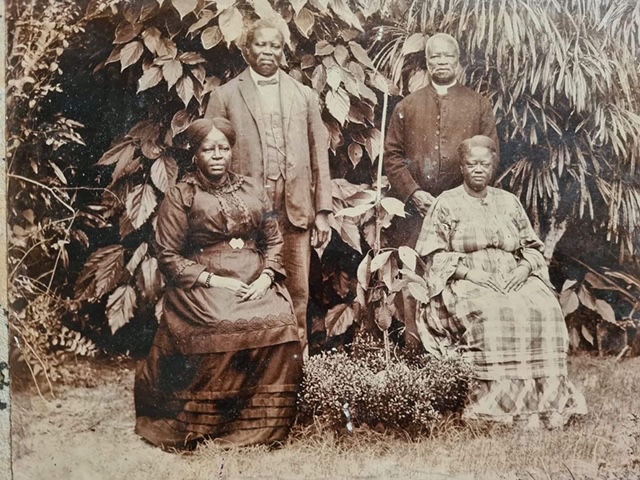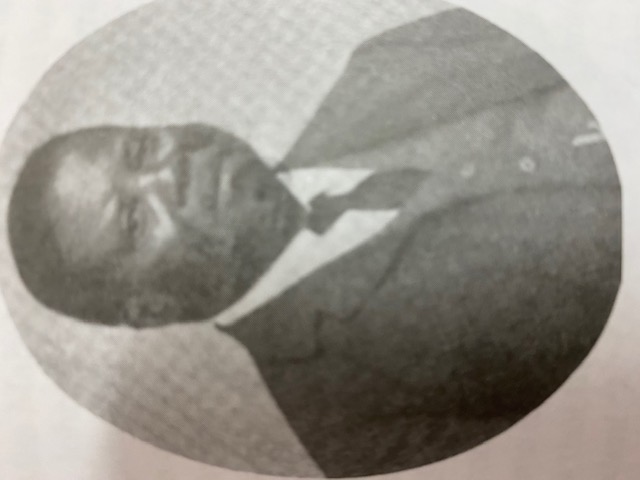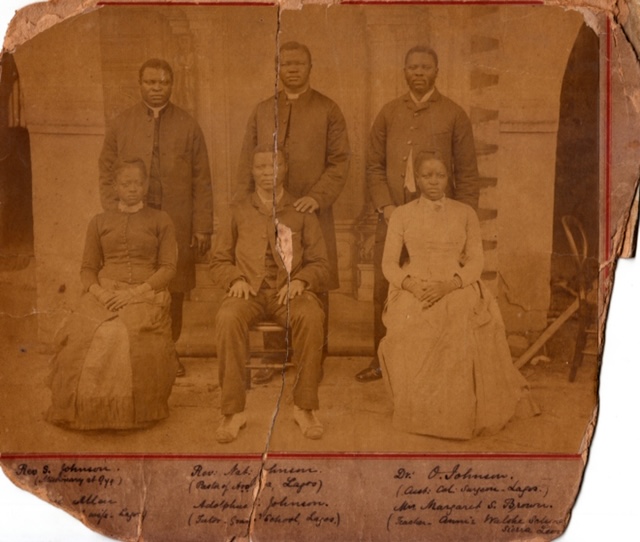THE LIFE AND TIMES OF OMO-OBA DR. OBADIAH JOHNSON (1849-1920)
TO MARK THE 100TH ANNIVERSARY OF HIS DEATH 12TH SEPTEMBER 2020.
By Rt. Revd Akinpelu Johnson M.Phil.; AKC; FKC
Omo-Oba Dr. Obadiah Johnson was a Creole (of Nigerian and Saro descent), the second Nigerian to qualify as a medical Doctor (Dr. Horton was probably the first), but the first indigenous Yoruba medical doctor.
He was also a writer, a great intellectual mind, a respecter of African culture and values and a social engineer who opposed racial discrimination. He also made immense contribution to the sanitation and environmental health of Lagos during his days in the Legislative Council.
Birth and Heritage
Born in Hastings, Sierra Leone, to Henry Johnson (Snr) (Erugunjimi) and Sarah Johnson on the 29th of June,1849, he was the 4th of the 7 children who survived their parents (Henry (Snr) who died on 10th February 1865) and (Sarah who died in June 1876) and both are buried in the cemetary of St. David’s Cathedral Kudeti, Ibadan. Obadiah’s parents had been captured as slaves but were liberated in Free-town and resettled in the village of Hastings. His father was a farmer and leader of the Church in Hastings and later became a church missionary worker. Henry ‘Erugunjimi’ Johnson (Erugunjimi being an appellation he gave himself meaning ‘slavery has favoured me’), was originally from Oyo-Ile, and a grandson of Alaafin Abiodun of the great Oyo Empire
In 1886, Obadiah married Mabel Emily Johnson daughter of Rev. Thomas Maxwell, (13th May 1865 – 20th September 1944). The couple unfortunately had no children. Obadiah’s siblings were:
- Venerable Henry Johnson Jnr- Born 10th November, 1840 – 1901
- Venerable Nathaniel Johnson- 1844 – 15th August, 1921.
- Reverend Samuel Johnson- 24th June1846 – 29th April, 1901.
- Mr. Adolphus Stephen Johnson
- Mrs. Margaret Sarah Brown (later Mrs. Cole) and
- Mrs. Rosaline Dorothy Allen
Education and Career
The young Obadiah started his formal education in 1855 at the Day School, Hastings, Sierra Leone. However, when in 1857 his father was invited by David Hinderer for mission work in Ibadan, Nigeria, Obadiah and the rest of the family (except Henry Jnr. who remained in Freetown and taught at the Grammar School) had to move to Ibadan. They arrived in Ibadan on February 11th1858.
He continued his education at the Day School Kudeti, Ibadan, which was then being run by Mrs. Anna Hinderer. He spent some time there and transferred to Lagos where he enrolled at Faji Day School in 1864. His older brother Nathaniel was a teacher at the School at this time.
When Obadiah finished his primary school education at the Faji Day School in 1868, he became an apprentice to a Lagos Carpenter, Mr. Joseph Pearse on Odunlami Street, Lagos. He subsequently also became apprenticed to Dr. A. A. Harrison, a Church Missionary Society medical doctor who practiced in Abeokuta. This apprenticeship tasked Obadiah physically and mentally and introduced him to medical terminology, equipment and drugs as he had to arrange what the doctor would need to use. It is believed that this probably ignited his interest to pursue a career in medicine.
In 1870, Obadiah returned to Sierra Leone for his Secondary School education at the Grammar school in Freetown. This he did from 1871 to 1873. Thereafter he taught at the Holy Trinity School, Kissy Road, Freetown, from 1874 to 1876 when he resigned his appointment. At the time of his resignation he had attained the position of Head Teacher of the school.
In 1876 Obadiah was admitted into the prestigious Fourah Bay College, Sierra Leone, from where he graduated in 1879 with a Bachelor of Arts degree in flying colours. He moved on to study medicine at King’s college, London, the first of four generations in the Johnson family to study at King’s. He was an exceptional student and he achieved the remarkable feat of winning “all the prizes in science” for his set. He graduated from the medical school in 1884 and was admitted into membership of the Royal College of Surgeons (MRCS) in April that year. He was also elected as an Associate Member of King’s College by the institution’s Council.
He went for further studies at the University of Edinburgh from where he graduated with an M. B., C. M. degree and in 1889 he bagged his M. D. degree. After his medical studies, he was appointed Assistant colonial Surgeon in Sierra Leone in 1889 and worked in Shebro District. From 1890 – 1897 he was the Chief Medical
Officer in Lagos. This is another historical feat (hitherto, only Europeans had held this office). He resigned from this position in July 1897 after suffering continued racial prejudices with dignity. Examples of such discrimination appeared in the discrepancy of the remuneration of the natives as opposed to the Europeans even when the natives were more qualified and experienced.
He had earlier experienced racial discrimination in 1893, when he applied for the vacant position of Senior Assistant Colonial Surgeon (which post was previously held by a European). His application was turned down despite the fact that he had superior qualifications than the person who vacated the post. When he resigned 1897, he set up his own private medical practice which was situated next to his residence (Marble Hall) on 50 Broad Street, the current site of the CSS Bookshop building
Publications
1. His thesis on, ‘West African Therapeutics’ in 1889, earned him his Doctor of Medicine degree (M.D.) from the Edinburgh University. This thesis described the medi-care traditionally practiced among West Africans “who have no English education”. The thesis centered around his own personal experiences and first-hand knowledge of practices in Sierra Leone and its neighbouring areas and more especially of Lagos and the “Yoruba Country” where he practiced medicine on his return from Europe.
2. He is the co-author of the pioneering historical work, “A HISTORY OF THE YORUBAS: FROM THE EARLIEST TIMES TO THE BEGINNING OF THE BRITISH PROTECTORATE”. This book was originally authored by his immediate elder brother – Revd. Samuel Johnson, but misfortune befell it’s original manuscript as he and his brother Samuel were informed by the first intended publisher that the original manuscript had been misplaced and could not be found. They perceived mischief and rejected the monetary offer by the first intended publisher to Samuel Johnson to buy the said ‘’lost’’ manuscript off him.
The author of the original manuscript did not live to re-write the book. Dr. Obadiah Johnson re-wrote the book from the copious notes and rough manuscript left by his brother (who died on 29th April, 1901).
Dr. Obadiah Johnson also did not live to see the publication of this great book because he died in September 1920 and the book was eventually published in London, in 1921 by George Rouledge and Sons. The eventual publication of this book etched the name of Rev. Samuel Johnson in world history and further re-affirmed Obadiah Johnson place as a diligent and dedicated person.

(Dr. Obadiah & Mrs. Mabel Emily Johnson and his brother, Venerable Nathaniel & Mrs. Eliza Zenobia Johnson nee Phillips)
SOCIAL IMPACT
Apart from his remarkable career in medical practice, Dr. Obadiah Johnson also made his mark in political affairs. From August 1901 to 1912, he was appointed an unofficial member of the legislative Council of the Colony of Lagos. He was an unofficial adviser to the Governor of the Colony. The role he played in this respect endeared him to many. His opinion became invaluable. He resigned from the legislative council in 1912 in protest against some (then) newly introduced policies of Governor Lugard after serving for 13 years. His tenure at the Legislative Council covered the period of 3 serving Governors in succession i.e. Sir Williams MacGregor, Governor Egerton and Lord Fredrick Lugard. He openly confronted government authorities on the issue of racial discrimination. His older brother, the Venerable Henry Johnson and Bishop James Johnson (Holy Johnson; not a relation of his), were ideological fellows in this regard. He advocated for the upholding of African culture and pushed for Africans to run their own affairs both in the church and in the larger society.
Church Life
He was a very prominent member of the Christ Church Marina Lagos, and in the current Christ Church Cathedral building, a stained glass window was installed on June 15, 1929 in his memory, paid for by his wife. It is possible, according to records at the Harrison & Harrison Organs of Durham, United Kingdom, that he was not just a prominent member of the Church, but a Church warden; for when in 1901 the company completed the first pipe organ for the Church during the tenure of Rev. Nathaniel Temple Hamlyn, his name was mentioned in correspondence as a Church warden.
From 1891, he served on several Church Committees and Boards. That year he was appointed by the Church Missionary Society as a member of the Visiting Committee of the Grammar School. He later became a member of the Parochial Committee of the Lagos District Church Council and in 1906, a member of the Diocesan Synod of Western Equatorial Africa. In the Synod he was a member of the Translation Committee, Procedure Committee, the Motions Committee and the Constitutional Amendments Committee. In 1910, he was appointed by the Church Missionary to the Publications Committee of the Church Missionary Society Bookshop.
Death
This principled gentleman, pioneer physician, scholar, shrewd legislator, politician and devout Christian lived a very active life and by the time of his death in1920, his contribution to society was recognized by all. He had travelled with his brother, the Venerable Nathaniel Johnson to Sierra Leone from Lagos on December 25th 1919 to recuperate from illness. On the stop-over in Accra, they picked up their sister, Mrs. Margaret Sarah Cole and her only daughter Patience Genista Cole, who were also both ill at this time and they arrived safely home in Hastings. Unfortunately, early in 1920, Mrs. Cole died. Nathaniel returned to Lagos after Mrs. Cole’s death and Obadiah sent for his wife from Lagos and together with his niece who was still ill at this time, they left for and arrived London in July 1920. There in London, both Obadiah and his niece died.
He died on the 12th of September aged 71, and she died 10 days later on the 22nd. Obadiah was buried in Kensel Green Cemetary on the 15th of September and a graveside service conducted by Bishop Isaac Oluwole and Bishop Howells was held. At the same time in Christ Church Lagos, a memorial service was held with a sermon by the Rev. T. A. J. Ogunbiyi.
He has indeed played his part very well. He was our great grand uncle and we are proud and inspired by his commitment to God and service to Man. May his soul continue to rest in perfect peace, Amen.
Signed:
Rt. Revd Akinpelu Johnson M.Phil.; AKC; FKC
Chairman: Venerable Henry Johnson Foundation for Theology and Social
Transformation on Behalf of the ‘Erugunjimi’ Henry Johnson Family.
BIBLIOGRAPHY
1. Dr. Adelola Adeloye. African Pioneers of Modern Medicine. University Press
Limited Nigeria. 1985.
2.Venerable B. C. Akinpelu Johnson “As For Me and My House … The Story
of a Levitical Dynasty”.
3. Wikipedia. Dr. Obadiah Johnson – https://en.m.wikipedia.org
4. Barr. Moumi Ogunlesi (nee Agbebi)



